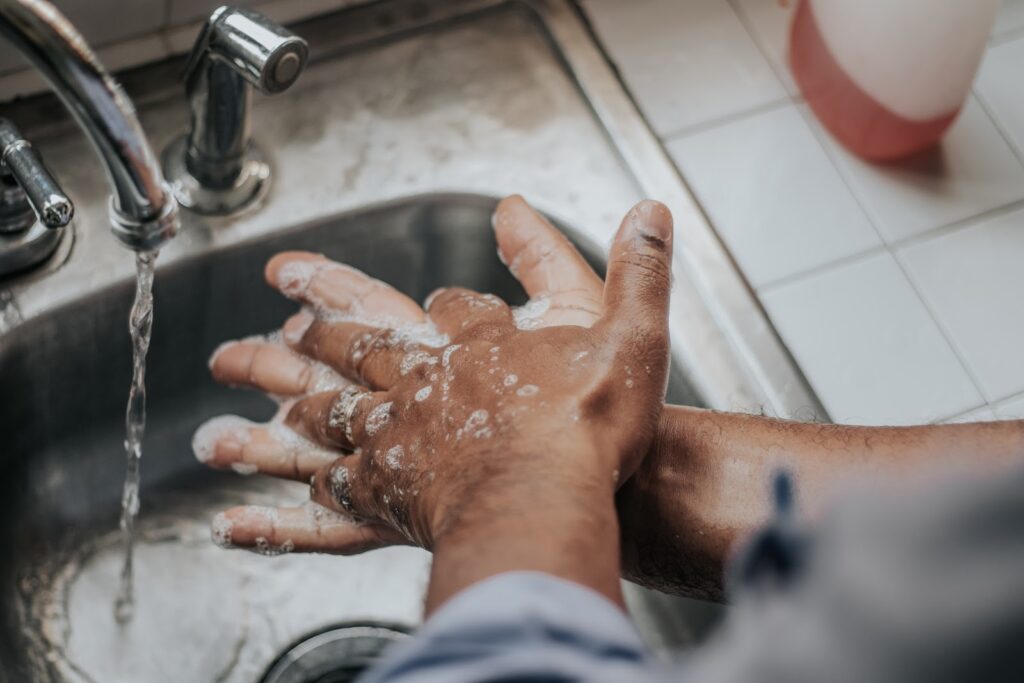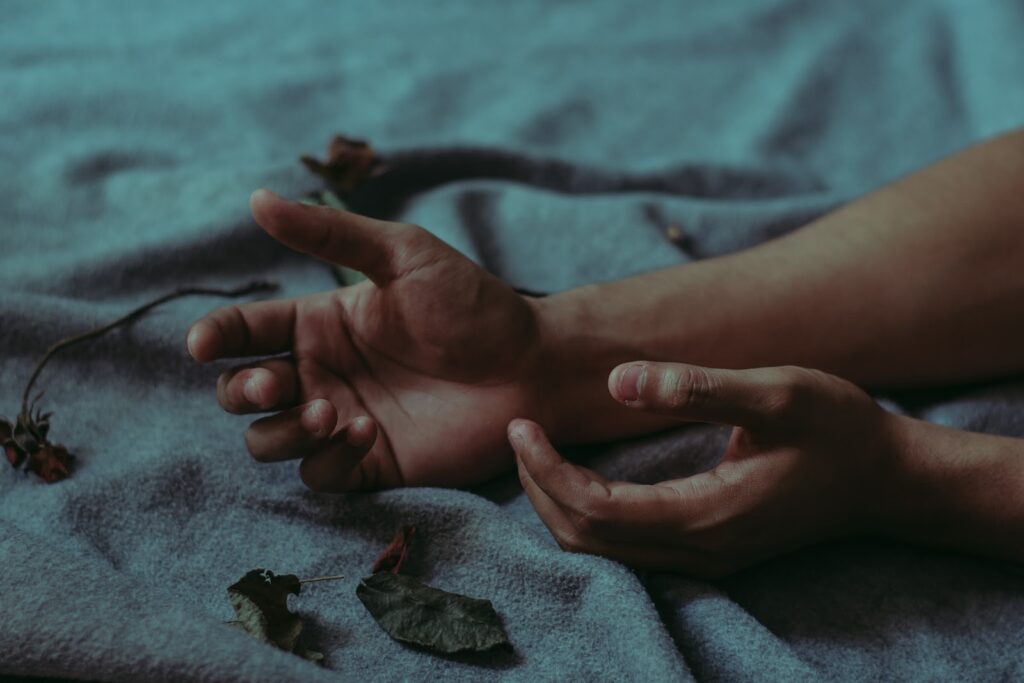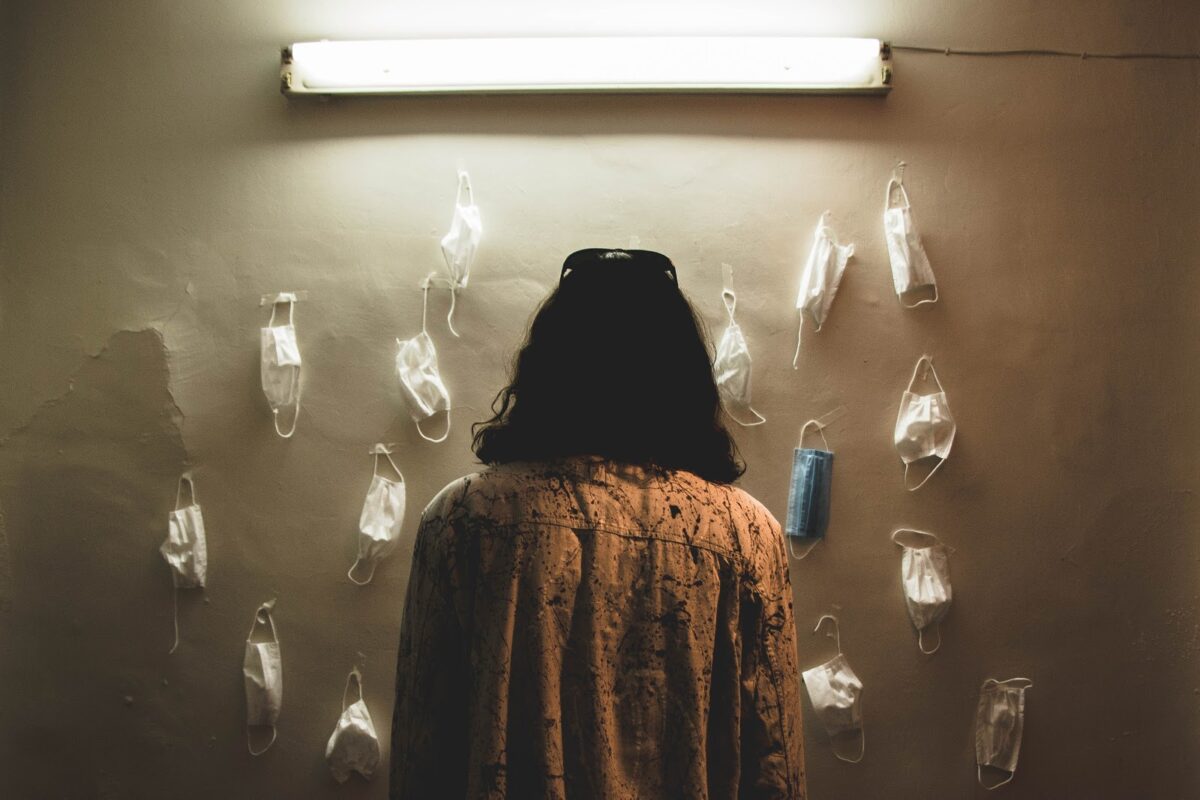Coronavirus Took My Anxiety to New Extremes. But Getting Help Wasn’t Easy.
For years, I’ve been showing up to doctors’ offices prepared to present my own diagnosis. A good number of times I’ve even been right. The reason? Health anxiety. On a good day, this means I may get stressed out if I think I have a cold. On a bad day, it can mean spending hours obsessing over whether the cramp in my stomach may signal a rare disease. It also means that I’ve been a painstakingly perceptive germaphobe well before COVID ever existed. I mean, it was probably somewhat inevitable – my mom was the type of parent who discreetly passed hand sanitizer down the church pew when I was a kid. While I rolled my eyes back then, I’d be lying if I said I wouldn’t do the same thing today. The thoughts about who may have touched what or where this could have been are second nature to me.
I sometimes think that if I was better informed about certain topics, say the inner workings of my body (which I undoubtedly learned in health class but have since forgotten), I’d have less anxiety. I’ve even considered trying to educate myself online. But in my experience, Googling symptoms or health-related questions typically produces greater panic, not relief. There is also the very real possibility that expanding my knowledge capacity could make my anxiety much worse. Sometimes ignorance is bliss. Or in this case, a slightly less scientifically-backed anxiety attack.
However, when the coronavirus pandemic began my anxiety started to change, taking its toll in ways I hadn’t experienced before. And despite the skyrocketing rates of anxiety and depression across the country, getting help still wasn’t easy.
How COVID Altered My Anxiety – And Not for the Better
At the start of the pandemic, like many, I diligently washed my hands and sanitized surfaces. But even then, I could tell my brain was responding to COVID-19 in an obsessive nature that took these actions to an extreme even for a germaphobe. I developed new routines and ways of being to manage or ward off the anxiety I felt. Rather than trying to reign in my fears, I allowed myself to indulge them, rationalizing that the circumstances were worthy of significant response.
The evolution of this anxiety has brought me to a place where it’s not just coronavirus that I fear – I am distrustful of anything I cannot see. It is the possibility of the unknown that scares me. I scrub my hands with soap and water so often that my skin splinters even when my hands are still. Red cracks circle my wrists and occasionally a fold of skin splits open where it’s impossible to place a Band-Aid.
I try, but fail, to hide the evidence; bathing my hands in lotion despite how it stings like a thousand needles pricking me all at once. But this pain is not the worst of it. As I look down at my cracked knuckles, the skin almost scale-like, I feel as though I have failed. I am reminded of the fears that control me; how they hold my agency captive. And for this, the sight of my hands brings me shame.

It’s More than Just Being a Germaphobe
You might assume that I am terribly afraid of getting COVID. You’re not entirely wrong, but even as a germaphobe, my fear is not so much about getting coronavirus as it is about spreading it.
What worries me is that I could already have COVID. Maybe I am asymptomatic or just a few days from the full force of the virus’ toll. Let’s say I go to the grocery store. I weave through the narrow aisles of Morton Williams and stand in the check-out line. There is an elderly man in front of me. He has on a mask and so do I, but the nature of the line forces us to be less than six feet apart, meaning that my coronavirus will most certainly pass onto him.
And because he is, let’s say, in his late seventies, maybe he has COPD. Or what if he had a kidney transplant last year? There is simply just no way around it – he will die and I will be undeniably responsible. And so, in summation, though I am a germaphobe, I’m not worried about getting COVID – I’m worried about killing the old man.
I’ve tried to explain this rationale to a few others but have typically received looks of confusion, and sometimes, concern. My parents are among this group. In September, I visited my mom and dad in Pennsylvania where I grew up. They were quick to notice my obsessive hand washing and teased me about the diligent way I ensured every inch of my hands got coated in soap.
“You could perform surgery with those hands,” my mom joked.
It felt good to laugh at myself. It provided a welcomed sense of relief. I thought that so long as I could laugh about being a germaphobe and my anxiety, it wasn’t that serious. But on the day I was supposed to head back to New York, I woke up with a slight headache and stuffy nose. These were symptoms that pre-pandemic-me wouldn’t have been overly worried about, but now I couldn’t escape the thought, “What if it’s coronavirus?”
“You don’t have coronavirus,” my dad said to me, placing his hands on my shoulders. “You are twenty-five years old. You are healthy. You have taken all the precautions.”
I knew this logic wasn’t entirely false. But I couldn’t ignore the fact that it wasn’t entirely without fault either. I didn’t know how to voice my anxiety over the small but very real possibility that I could have the virus. I didn’t know how to explain that I wasn’t worried about what the virus would do to me. And I definitely didn’t know how to bring up the old man.
As I continued to stand nervously in our kitchen, my parents’ expressions intensified with both anger and concern. My mom, in a quiet but grave voice, asked, “Are you okay?”
I immediately broke into tears. Laughing no longer felt possible.
The narrative has become that if you are suffering from anxiety, depression or any kind of mental illness, you should seek help. But navigating the healthcare system and finding the right care can be a challenging process.
We Can’t Help You Here
It was a few weeks later, when I was back in New York, that I decided it was time to seek help. When I wasn’t feeling anxious or counteracting my anxiety with various fear-reducing germaphobe routines, I was exhausted. Heavy. And finally, a thought occurred to me: “Is this what depression feels like?”
While the thought of going to the doctor’s office, where COVID could be anywhere and everywhere, made my muscles tense, I decided to make an in-person appointment with a doctor in my neighborhood. The appointment began with waiting in a cold, windowless examination room. It was raining that day and my hair, which had been neatly tied back in a low bun, now resembled a frizzy mane. It seemed a slightly more appropriate look for how I was feeling.
I planned to tell the doctor about my anxiety, exhaustion and lack of motivation. But from the moment she walked into the room, she was fixated on something else.
“Your blood pressure is high,” she said, referring to the report from the nurse who had taken my blood pressure just a few minutes earlier. In search of a potential cause, she began asking a series of questions. When she paused to review my chart, I slipped in my own question – the one she hadn’t asked.
“Can anxiety cause high blood pressure?”
“Yes, it can,” she said.
I realized this was my opportunity to share how the pandemic had affected me as a germaphobe and the reason I had come to see her. I took a breath and began reciting the words I’d rehearsed in my head on the walk over, ending with, “I was hoping to discuss medication.” I hated the way my voice sounded so helplessly optimistic.
“You should speak to a psychologist,” she said abruptly. “They’ll be able to determine the best treatment.”
And just like that, the conversation was over.
It was clear there was a line she did not wish to cross. She was a doctor of the body, not the mind I suppose, despite having indicated that anxiety could be more or less raising my blood pressure. I left with no prescription; only the very vague instruction to “eat less salt.”

Getting Help Isn’t as Easy as Just Asking
Walking out of the doctor’s office, I felt more lost than I had going in. And what upset me the most was that I couldn’t help but feel it was my fault. I should have known to go to a psychologist. It was my mistake. I had finally found the strength to ask for help only to be told that I had come to the wrong place.
In the very least, the receptionist gave me a list of recommended psychologists, along with kindly informing me that I could book an appointment with their office’s psychologist – it would just be $400 for the first appointment and $250 for each subsequent appointment (sigh). Hearing this high cost only incited more anxiety. A few months prior, like millions of others, I had been laid off from my job. I had no prospects at the time and on top of that, I was about to lose my health insurance.
I wanted help and looking back, I realize now how much I needed it. But the list of psychologists sat on my dresser unread for another two months. This time was among the most difficult of the past year, but I’m glad to say that since then, I’ve gotten help and am in a better place now.
For anyone who has ever struggled to obtain mental health support – whether you are a germaphobe or not – you are not alone. You are not at fault. You have done nothing wrong. The narrative has become that if you are suffering from anxiety, depression or any kind of mental illness, you should seek help. But navigating the healthcare system and finding the right care can be a challenging process.
Simply stated, getting help isn’t as easy as just asking for it. And if we are unable to get help, it’s easy to blame ourselves. But even if others fail to provide us the support we deserve, asking for help when we need it is still one of the bravest things we can do.
If you or someone you know is struggling with anxiety or depression, the following resources can provide information on how and where to seek help.
Anxiety & Depression Association of America
National Alliance on Mental Illness
National Institute of Mental Health
National Suicide Prevention Lifeline: 800-273-TALK or 800-273-8255




